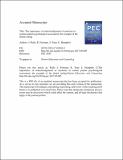Files in this item
The importance of acknowledgement of emotions in routine patient psychological assessment : the example of the dental setting
Item metadata
| dc.contributor.author | Hally, J. | |
| dc.contributor.author | Freeman, R. | |
| dc.contributor.author | Yuan, S. | |
| dc.contributor.author | Humphris, G. | |
| dc.date.accessioned | 2018-05-05T23:32:48Z | |
| dc.date.available | 2018-05-05T23:32:48Z | |
| dc.date.issued | 2017-11 | |
| dc.identifier | 249950587 | |
| dc.identifier | 0b6b3ff0-fd84-492b-a26f-1996b1d6d676 | |
| dc.identifier | 85020483107 | |
| dc.identifier | 000410632500022 | |
| dc.identifier.citation | Hally , J , Freeman , R , Yuan , S & Humphris , G 2017 , ' The importance of acknowledgement of emotions in routine patient psychological assessment : the example of the dental setting ' , Patient Education and Counseling , vol. 100 , no. 11 , pp. 2102-2105 . https://doi.org/10.1016/j.pec.2017.05.005 | en |
| dc.identifier.issn | 0738-3991 | |
| dc.identifier.other | RIS: urn:FD3426E6DC861C065F3B228C0D2E56BE | |
| dc.identifier.other | ORCID: /0000-0002-4601-8834/work/64033918 | |
| dc.identifier.uri | https://hdl.handle.net/10023/13304 | |
| dc.description | This work was funded by the Chief Scientist Office, Scotland under their Clinical Academic Fellowship Scheme (grant number: CAF/07/02). | en |
| dc.description.abstract | Objective: To investigate, by means of a conceptual model, the effect of dental staff engaging with their patients who share their level of dental anxiety in a short screening questionnaire. Methods : Three consecutive studies based in the UK primary dental care services were conducted. Each study adopted a randomised group design to focus on the possible influence on patient state anxiety of the dentist becoming aware of their patients' dental anxiety from the self-reports of the Modified Dental Anxiety Scale (MDAS). Results : A consistent finding in the first two studies was that the presentation of MDAS score sheet to the dentist was effective in reducing patient state anxiety when leaving the surgery. The third study provided supportive evidence that a more permanent anxiolytic effect of the presentation of the MDAS to the dentist was associated with the dentist responding openly to their patient about the fears expressed. Conclusion: The active engagement of dental staff in the formal presentation of dental anxiety screening confers a reliable benefit to dentally anxious patients. Clinical implications: Anxiety assessments in clinical service may give patients significant relief when staff acknowledge and engage patients when presented with their self-reported ratings. | |
| dc.format.extent | 531164 | |
| dc.language.iso | eng | |
| dc.relation.ispartof | Patient Education and Counseling | en |
| dc.subject | Dental anxiety | en |
| dc.subject | Interaction | en |
| dc.subject | Self-report measure | en |
| dc.subject | Dentist | en |
| dc.subject | Patient | en |
| dc.subject | Communication | en |
| dc.subject | H Social Sciences | en |
| dc.subject | BF Psychology | en |
| dc.subject | RA0421 Public health. Hygiene. Preventive Medicine | en |
| dc.subject | RK Dentistry | en |
| dc.subject | NDAS | en |
| dc.subject | SDG 3 - Good Health and Well-being | en |
| dc.subject.lcc | H | en |
| dc.subject.lcc | BF | en |
| dc.subject.lcc | RA0421 | en |
| dc.subject.lcc | RK | en |
| dc.title | The importance of acknowledgement of emotions in routine patient psychological assessment : the example of the dental setting | en |
| dc.type | Journal article | en |
| dc.contributor.institution | University of St Andrews. School of Medicine | en |
| dc.contributor.institution | University of St Andrews. WHO Collaborating Centre for International Child & Adolescent Health Policy | en |
| dc.contributor.institution | University of St Andrews. Health Psychology | en |
| dc.contributor.institution | University of St Andrews. St Andrews Sustainability Institute | en |
| dc.contributor.institution | University of St Andrews. Population and Behavioural Science Division | en |
| dc.identifier.doi | 10.1016/j.pec.2017.05.005 | |
| dc.description.status | Peer reviewed | en |
| dc.date.embargoedUntil | 2018-05-05 |
This item appears in the following Collection(s)
Items in the St Andrews Research Repository are protected by copyright, with all rights reserved, unless otherwise indicated.

